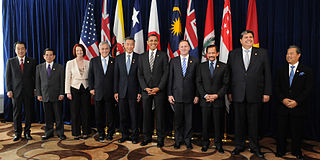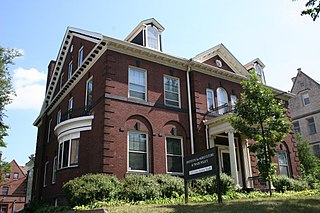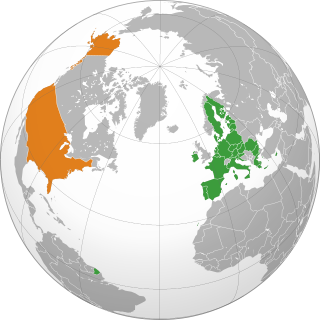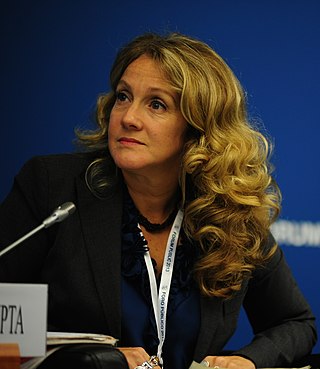
The World Trade Organization (WTO) is an intergovernmental organization headquartered in Geneva, Switzerland that regulates and facilitates international trade. Governments use the organization to establish, revise, and enforce the rules that govern international trade in cooperation with the United Nations System. The WTO is the world's largest international economic organization, with 166 members representing over 98% of global trade and global GDP.

The Free Trade Area of the Americas was a proposed agreement to eliminate or reduce the trade barriers among all countries in the Americas, excluding Cuba. Negotiations to establish the FTAA ended in failure, however, with all parties unable to reach an agreement by the 2005 deadline they had set for themselves.

Public Citizen is an American non-profit, progressive consumer rights advocacy group, and think tank based in Washington, D.C.. It was founded in 1971 by the American activist and lawyer Ralph Nader.

The 1999 Seattle WTO protests, sometimes referred to as the Battle of Seattle, were a series of anti-globalization protests surrounding the WTO Ministerial Conference of 1999, when members of the World Trade Organization (WTO) convened at the Washington State Convention and Trade Center in Seattle, Washington on November 30, 1999. The Conference was to be the launch of a new millennial round of trade negotiations.

The Dominican Republic–Central America–United States Free Trade Agreement is a free trade agreement. Originally, the agreement encompassed the United States and the Central American countries of Costa Rica, El Salvador, Guatemala, Honduras, and Nicaragua, and was called CAFTA. In 2004, the Dominican Republic joined the negotiations, and the agreement was renamed CAFTA-DR.
The Doha Development Round or Doha Development Agenda (DDA) is the trade-negotiation round of the World Trade Organization (WTO) which commenced in November 2001 under then director-general Mike Moore. Its objective was to lower trade barriers around the world, and thus increase global trade.
The Multilateral Agreement on Investment (MAI) was a draft agreement negotiated in secret between members of the Organisation for Economic Co-operation and Development (OECD) between 1995 and 1998. It sought to establish a new body of universal investment laws that would grant corporations unconditional rights to engage in financial operations around the world, without any regard to national laws and citizens' rights. The draft gave corporations a right to sue governments if national health, labor or environment legislation threatened their interests. When its draft became public in 1997, it drew widespread criticism from civil society groups and developing countries, particularly over the possibility that the agreement would make it difficult to regulate foreign investors. After an intense global campaign was waged against the MAI by the treaty's critics, the host nation France announced in October 1998 that it would not support the agreement, effectively preventing its adoption due to the OECD's consensus procedures.

The Trans-Pacific Partnership (TPP), or Trans-Pacific Partnership Agreement (TPPA), was a proposed trade agreement between 12 Pacific Rim economies: Australia, Brunei, Canada, Chile, Japan, Malaysia, Mexico, New Zealand, Peru, Singapore, Vietnam, and the United States. In the United States, the proposal was signed on 4 February 2016 but not ratified as a result of significant domestic political opposition. After taking office, the newly elected President Donald Trump formally withdrew the United States from TPP in January 2017, therefore ensuring the TPP could not be ratified as required and did not enter into force. The remaining countries negotiated a new trade agreement called Comprehensive and Progressive Agreement for Trans-Pacific Partnership, which incorporated most of the provisions of the TPP and which entered into force on 30 December 2018.

The WTO Ministerial Conference of 1999 was the third Ministerial-level meeting of the World Trade Organization, convened at the Washington State Convention and Trade Center in Seattle, Washington, USA, over the course of four days, from Tuesday, 30 November 1999 to Friday, 3 December 1999. Anti-globalization activists organized large-scale protests of the meeting, sometimes known as the Battle of Seattle. Direct action tactics forced the WTO Ministerial Conference to begin late on 30 November and contributed to the meeting ending without agreement on 3 December.
Todd Nathaniel Tucker is an American academic, political scientist, and political commentator who is director of governance studies at the Roosevelt Institute, where he specializes in the study of trade agreements and international law.
The fast track authority for brokering trade agreements is the authority of the President of the United States to negotiate international agreements in an expedited manner and with limited congressional oversight. Renamed the trade promotion authority (TPA) in 2002, the TPA is an impermanent power granted by Congress to the President. It remained in effect from 1975 to 1994, pursuant to the Trade Act of 1974 and from 2002 to 2007 pursuant to the Trade Act of 2002. Although it technically expired in July 2007, it remained in effect for agreements that were already under negotiation until their passage in 2011. In June 2015, a third renewal passed Congress and was signed into law by President Barack Obama.

Since its creation in 1995, the World Trade Organization (WTO) has worked to maintain and develop international trade. As one of the largest international economic organizations, it has strong influence and control over trading rules and agreements, and thus has the ability to affect a country's economy immensely. The WTO policies aim to balance tariffs and other forms of economic protection with a trade liberalization policy, and to "ensure that trade flows as smoothly, predictably and freely as possible". Indeed, the WTO claims that its actions "cut living costs and raise standards, stimulate economic growth and development, help countries develop, [and] give the weak a stronger voice." Statistically speaking, global trade has consistently grown between one and six percent per annum over the past decade, and US$38.8 billion were allocated to Aid for Trade in 2016.
Rufus Hawkins Yerxa is a retired American lawyer and former U.S. government and international official. He served as Deputy United States Trade Representative during the George H.W. Bush and Clinton Administrations, and served for 11 years as Deputy Director General of the World Trade Organization (WTO). From 2016 to 2021 he was President of the National Foreign Trade Council.

The Agreement on Trade-Related Aspects of Intellectual Property Rights (TRIPS) is an international legal agreement between all the member nations of the World Trade Organization (WTO). It establishes minimum standards for the regulation by national governments of different forms of intellectual property (IP) as applied to nationals of other WTO member nations. TRIPS was negotiated at the end of the Uruguay Round of the General Agreement on Tariffs and Trade (GATT) between 1989 and 1990 and is administered by the WTO.

The Institute for Agriculture and Trade Policy (IATP) is an international non-profit research and advocacy organization that promotes sustainable food, farm, and trade systems. IATP has offices in Minneapolis, Minnesota, Washington, D.C., Geneva, Switzerland and Berlin, Germany.

The Transatlantic Trade and Investment Partnership (TTIP) was a proposed trade agreement between the European Union (EU) and the United States, with the aim of promoting trade and multilateral economic growth. According to Karel de Gucht, European Commissioner for Trade between 2010 and 2014, the TTIP would have been the largest bilateral trade initiative ever negotiated, not only because it would have involved the two largest economic areas in the world but also "because of its potential global reach in setting an example for future partners and agreements".

Lori Wallach is the Director of Rethink Trade at the American Economic Liberties Project and a senior advisor to the Citizens Trade Campaign. She is known for her extensive work translating arcane trade-agreement provisions into what they mean for people's lives and advocating for fair trade policies. She has played a key role in shaping public discourse on trade issues.

Deborah James is an American activist. She is director of international programs at the Center for Economic and Policy Research (CEPR) and is on the Board of Directors of Global Exchange. Prior to her work for CEPR, James had been called "a top U.S. protest organizer" by the Center for Public Integrity. She was formerly the Director of the WTO Program at Public Citizen's Global Trade Watch, the Global Economy Director at Global Exchange, and the Executive Director of the Venezuela Information Office.
Between 1967 and 2016, the Emergency Committee for American Trade (ECAT) was a U.S. trade body representing U.S.-based international business enterprises from the principal sectors of the U.S. economy.

Anabel González is an economic development expert. She is currently Vice President for Countries at the Inter-American Development Bank (IDB).













